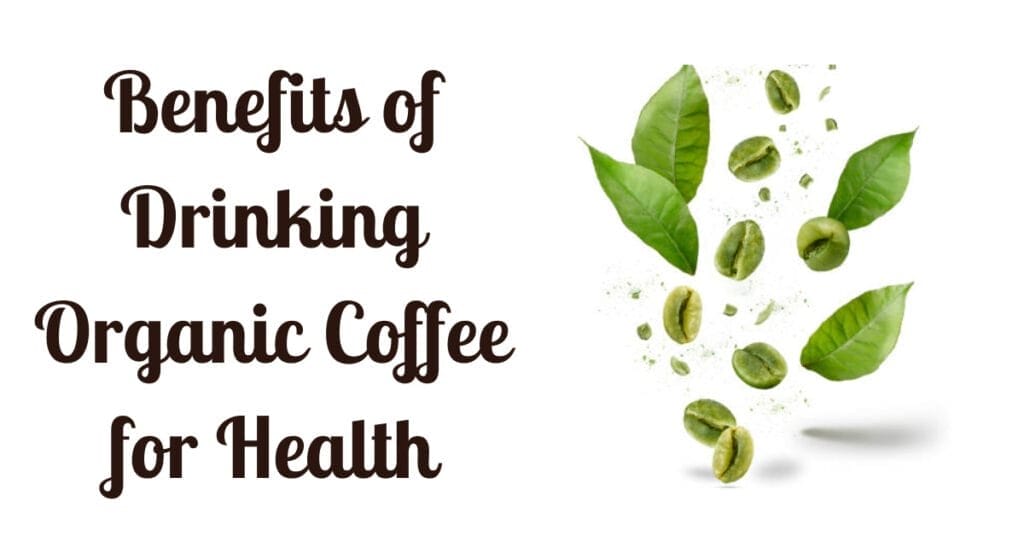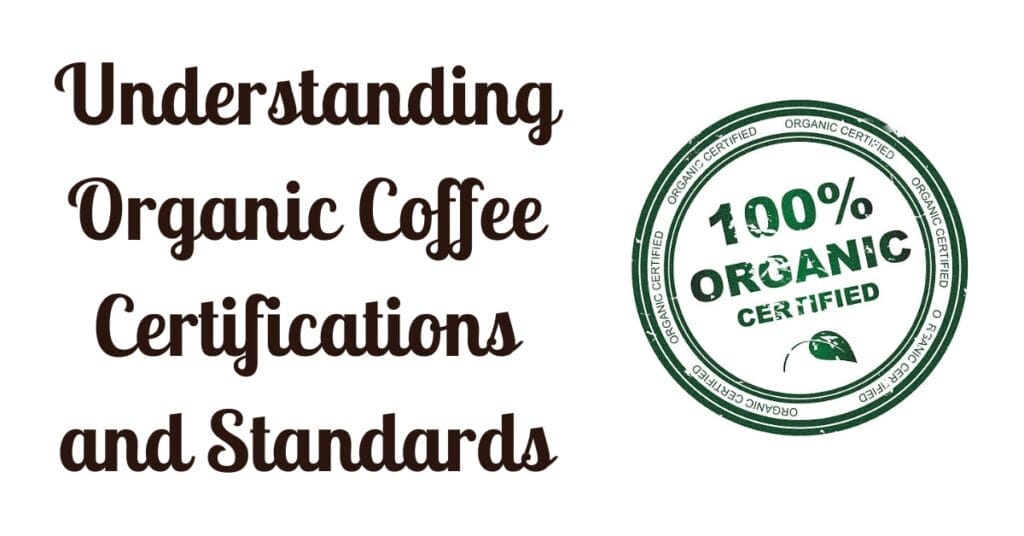Welcome to the world of coffee connoisseurship, where every sip tells a story—especially regarding organic coffee.
In this blog, we embark on a journey of discovery as we delve into the intricacies of deciphering organic coffee labels.
Decoding organic coffee labels is not just about unravelling the mysteries behind the beans; it’s about understanding the commitment to sustainable practices, environmental consciousness, and the pursuit of exceptional quality that sets these coffees apart.
As we navigate the nuanced language of coffee packaging, we’ll uncover what “organic” truly means for your morning brew.
In our quest for the best coffee, we’ll unravel the terminology, certifications, and industry standards contributing to the organic coffee experience.
So, join us as we sift through the aromatic layers of information, empowering you to make informed choices and savor the richness of the best coffee, sip by sip.
Get ready to elevate your coffee-drinking experience by mastering the art of decoding organic coffee labels.
As an affiliate site, we are associated with the amazon. We might receive a commission when you use links or recommendations on our website to make qualified purchases. The cost you pay for the goods or services is unaffected by this.
Table of Contents
Decoding Organic Coffee Labels: Understanding Basics

”Decoding Organic Coffee Labels” is unravelling the information on coffee packaging to comprehend the production methods, certifications, and ethical practices associated with coffee beans.
This skill is crucial for consumers seeking a deeper understanding of their coffee, aligning with sustainability, environmental consciousness, and ethical sourcing values.
Why It Matters
1. Environmental Impact
Deciphering organic coffee labels ensures that the coffee beans were cultivated without synthetic pesticides or genetically modified organisms, promoting eco-friendly farming practices.
2. Ethical Sourcing
Consumers can verify if the coffee brand adheres to fair labor conditions, contributing to the well-being of coffee farmers and fostering social sustainability.
3. Quality Assurance
Understanding labels allows consumers to identify certified organic products, guaranteeing a certain level of quality and adherence to strict industry standards.
4. Biodiversity Conservation
Labels like “shade-grown” or “bird-friendly” indicate a commitment to preserving ecosystems, contributing to biodiversity, and creating a healthier environment.
How to Examine Organic Coffee Labels
1. Look for Certifications
The presence of certifications such as USDA Organic or Fair Trade on the label signifies adherence to specific standards. Understand what these certifications entail.
2. Check for Ethical Sourcing Claims
Examine the label for indications of ethically sourced beans, ensuring that the supply chain maintains integrity and fairness from cultivation to consumption.
3. Understand Environmental Practices
Terms like “shade-grown” or “direct trade” provide insights into a brand’s commitment to environmental sustainability and ethical business practices.
4. Explore Origin Information
Understanding the origins of coffee can provide clues about farming practices, allowing consumers to make informed decisions.
5. Research the Brand
Investigate the brand’s overall philosophy and practices. Transparent brands often provide detailed information about sourcing, sustainability initiatives, and ethical commitments on their websites.
By mastering the art of ‘’Decoding Organic Coffee Labels’’, consumers empower themselves to make choices that align with their values, contributing to a more sustainable and ethically conscious coffee industry.
Decoding Organic Coffee Labels: Unveiling Names

Numerous organic coffee labels and certifications indicate a commitment to organic and sustainable practices. Here are some well-known organic coffee labels:
1. USDA Organic
This certification from the United States Department of Agriculture ensures that the coffee has been produced using organic farming practices.
2. Rainforest Alliance Certified
A green frog seal often represents this certification and signifies adherence to environmental, social, and economic sustainability standards.
3. Fair Trade Certified
Focused on fair labor practices and community development, Fair Trade certification ensures that coffee producers receive fair wages for their work.
4. Bird-Friendly Coffee
This label is associated with the Smithsonian Migratory Bird Center. It indicates that coffee is grown in a way that supports bird habitats and biodiversity.
5. Shade-Grown
Coffee labeled as shade-grown is cultivated under the canopy of trees, preserving natural habitats and promoting biodiversity.
6. UTZ Certified
This label signifies that the coffee has been produced in a socially and environmentally responsible manner, with a focus on sustainable farming practices.
7. Organic Coffee Certifications (Various Countries)
Different countries may have organic certifications, such as Canada Organic, EU Organic, or Japan Agricultural Standard (JAS).
8. Direct Trade
While not a certification, coffee labelled “Direct Trade” indicates that the coffee roaster has established a direct relationship with the coffee producer, often emphasizing transparency and fair compensation.
9. Smithsonian Bird-Friendly Certification
This certification focuses on biodiversity and ensures that coffee is grown in a way that supports bird habitats.
10. Non-GMO Project Verified
While not specific to coffee, this label indicates that the product does not contain genetically modified organisms (GMOs).
These labels help consumers make informed choices by providing insights into the production methods, ethical considerations, and sustainability practices associated with the coffee they choose.
Demystifying Rainforest Alliance Certification in Your Coffee
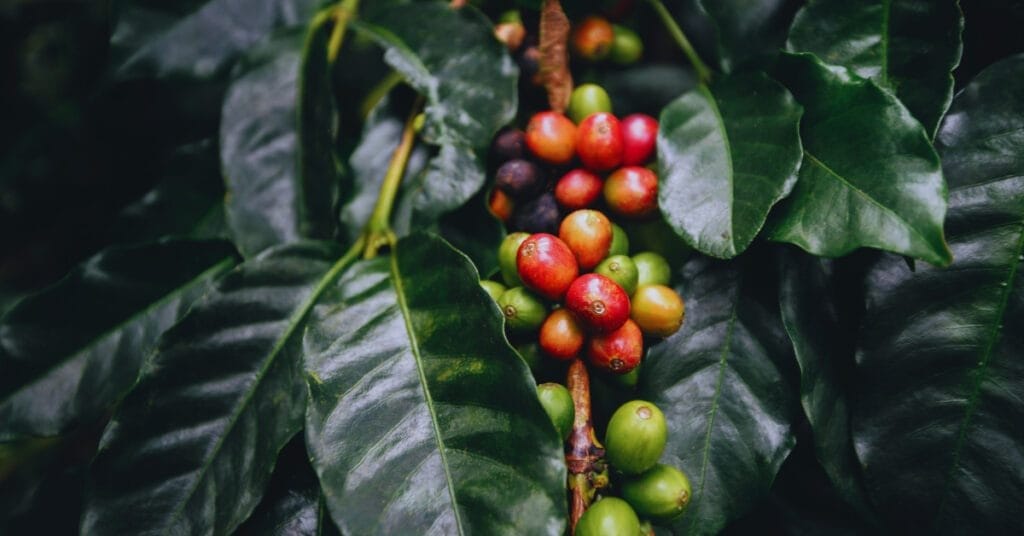
‘’Rainforest Alliance Certification’’ is a significant aspect of ‘’Decoding Organic Coffee Labels’’ that delves into the environmental and ethical practices associated with coffee production.
This certification, denoted by a distinctive green frog seal, signifies that the coffee beans have been cultivated in a manner that aligns with the rigorous standards set by the Rainforest Alliance.
What It Signifies
1. Sustainable Farming Practices
The certification ensures that the coffee is grown using environmentally sustainable methods, promoting soil health, water conservation, and biodiversity.
2. Economic and Social Impact
Rainforest Alliance certification goes beyond environmental considerations. It also addresses fair labor practices, supporting the livelihoods of coffee farmers and their communities.
3. Wildlife Conservation
The certification often involves measures to protect wildlife habitats, contributing to the preservation of ecosystems and biodiversity.
How to Identify Rainforest Alliance Certification
1. Look for the Frog Seal
The iconic green frog seal is a clear indicator of Rainforest Alliance certification. Brands proudly display this seal on their packaging to communicate their commitment to sustainable and ethical practices.
2. Check Labeling Information
Labels and packaging often explicitly mention Rainforest Alliance certification. Look for phrases like “Rainforest Alliance Certified” or “Rainforest Alliance Seal” to ensure the coffee meets these standards.
Why It Matters in the Context of Decoding Organic Coffee Labels
1. Comprehensive Understanding
Decoding organic coffee labels involves recognizing the significance of certifications like Rainforest Alliance in ensuring a holistic understanding of the coffee’s journey from farm to cup.
2. Environmental Consciousness
For consumers passionate about environmental conservation, the Rainforest Alliance Certification assures them that their coffee choice aligns with sustainable and eco-friendly farming practices.
3. Ethical Considerations
By demystifying Rainforest Alliance Certification, consumers actively engage in ethical decision-making, supporting brands and practices prioritising people and the planet.
In essence, ‘’Decoding Organic Coffee Labels’’ involves recognizing the value of certifications like Rainforest Alliance in making informed choices that resonate with environmental and ethical considerations.
Unveiling the Standards Behind Your Coffee Cup | USDA Organic
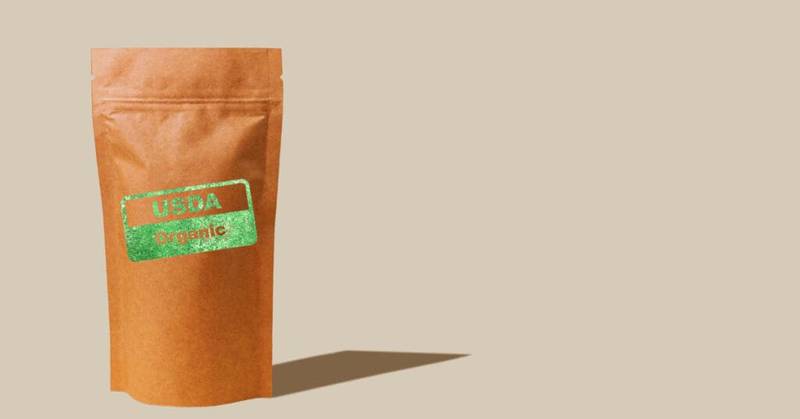
”Decoding Organic Coffee Labels” involves understanding the significance of the USDA Organic Certification, a pivotal aspect in ensuring your coffee’s quality, purity, and ethical production.
What USDA Organic Certification Signifies
1. No Synthetic Chemicals
Coffee beans labelled USDA Organic are grown without synthetic pesticides, herbicides, or genetically modified organisms (GMOs). This ensures a cleaner and more natural product.
2. Environmental Stewardship
Organic coffee farming practices under USDA standards prioritize soil health, biodiversity, and water conservation. This certification contributes to the overall sustainability of coffee production.
3. Strict Certification Process
To receive USDA organic certification, coffee producers must adhere to rigorous standards and undergo regular inspections. This process ensures that the coffee meets the defined organic criteria.
How to Identify USDA Organic Coffee
1. Label Verification
Look for the USDA Organic seal on the packaging. This seal indicates that the coffee has met the stringent organic standards of the United States Department of Agriculture.
2. Check Labeling Information
Packaging often includes phrases like “USDA Organic” or “Certified Organic.” These terms confirm that the coffee adheres to established organic farming practices.
Why USDA Organic Matters in the Context of Decoding Organic Coffee Label
1. Quality Assurance
The USDA Organic label assures consumers of a certain level of quality. It guarantees that the coffee beans are produced without synthetic additives, producing a purer and more natural product.
2. Health Consideration
For individuals concerned about exposure to pesticides and chemicals, choosing USDA organic coffee provides a healthier option that aligns with their wellness goals.
3. Environmental Impact
Decoding coffee labels with the USDA Organic certification emphasizes a commitment to sustainable and environmentally friendly coffee farming practices, supporting the planet’s and consumers’ health.
By demystifying the standards behind USDA Organic certification, ‘’Decoding Organic Coffee Labels’’ empowers consumers to make informed choices that prioritize quality, sustainability, and ethical practices in their coffee selection.
Fair Trade Certified Coffee | Decoding Organic Coffee Labels
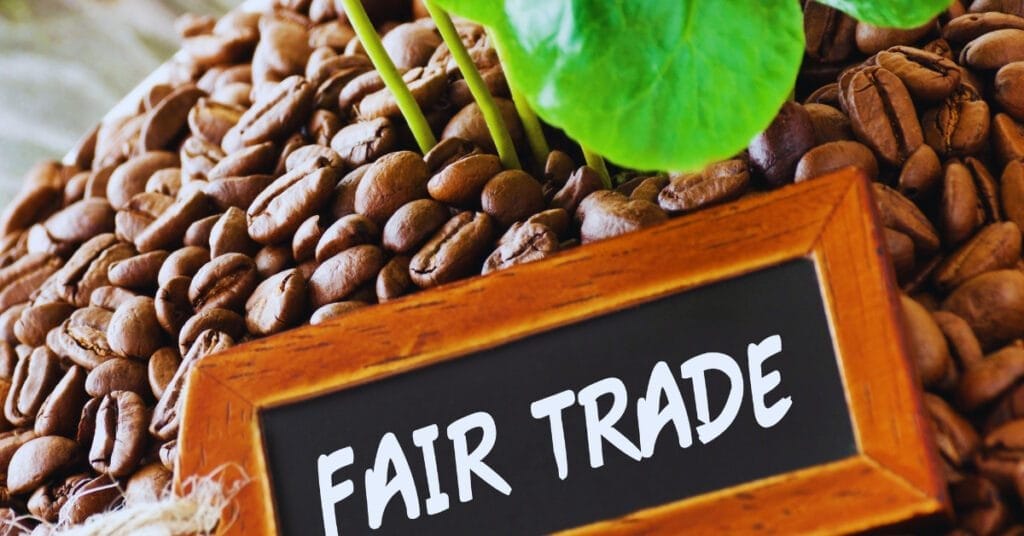
‘’Decoding Organic Coffee Labels’’ extends beyond purity and environmental consciousness; it delves into the ethical dimensions of coffee production.
Enter the world of ‘’Fair Trade Certification’’, a beacon guiding consumers toward socially responsible choices in their coffee selection.
Fair Trade Certified coffee signifies more than just a label; it’s a commitment to fair labor practices, equitable wages, and community development.
For coffee producers, it translates to empowerment and a tangible impact on their livelihoods.
This certification ensures that your chosen beans have been cultivated humanely, reflecting a dedication to social justice.
In pursuing sustainable and ethically sourced coffee, the importance of Fair Trade Certification cannot be overstated.
It resonates with consumers who prioritize not only the organic purity of their coffee but also the assurance that their choice contributes to a more just and equitable global coffee industry.
So, when ‘’decoding organic coffee labels’’, pay attention to the Fair Trade Certified seal—a powerful symbol of positive change in every cup.
Bird-Friendly Coffee || Preserving Biodiversity in Your Brew

‘’Bird-Friendly Coffee’’ isn’t just a label; it’s a commitment to sustainable and environmentally conscious coffee production.
Thiscertification, typicallyassociated withthe Smithsonian MigratoryBird Center, ensures that coffee is grown to support bird habitats and biodiversity.
In bird-friendly coffee cultivation, coffee plants thrive under a canopy of trees, mirroring natural forest conditions.
This approach provides a haven for migratory birds, preserving their habitats and contributing to the ecosystem’s overall health.
The certification process involves stringent criteria to ensure the farm’s agricultural practices harmonize with nature.
The significance of bird-friendly coffee extends beyond the beans in your cup. It addresses the alarming decline in bird populations, deforestation, and the loss of biodiversity associated with conventional coffee farming.
By choosing bird-friendly coffee, consumers play a vital role in supporting sustainable agricultural practices and protecting the delicate balance of ecosystems.
In coffee, understanding and appreciating the importance of bird-friendly certification goes hand-in-hand with ‘’decoding organic coffee labels’’.
It’s a choice that delivers a rich and flavorful cup and contributes to preserving our planet’s diverse and interconnected ecosystems.
Shade-Grown Coffee: A Sustainable Canopy for Quality Brews

‘’Shade-grown coffee’’ is cultivated under the protective canopy of trees, preserving natural ecosystems and promoting biodiversity.
This method mimics the coffee plant’s native habitat, fostering a more sustainable and environmentally friendly approach to cultivation.
The importance of shade-grown coffee lies in its positive impact on soil health, water conservation, and wildlife preservation.
The canopy shieldsthe coffee plants from harsh sunlight, reducing the need for synthetic inputs and providing a habitat for birds and other wildlife.
By choosing shade-grown coffee, consumers contribute to preserving ecosystems, supporting biodiversity, and endorsing farming practices that prioritize environmental sustainability. It’s a flavorful choice that goes beyond the cup, aligning with a commitment to ethical and eco-conscious coffee consumption.
UTZ Certified Coffee || Elevating Standards for Sustainable Harvests
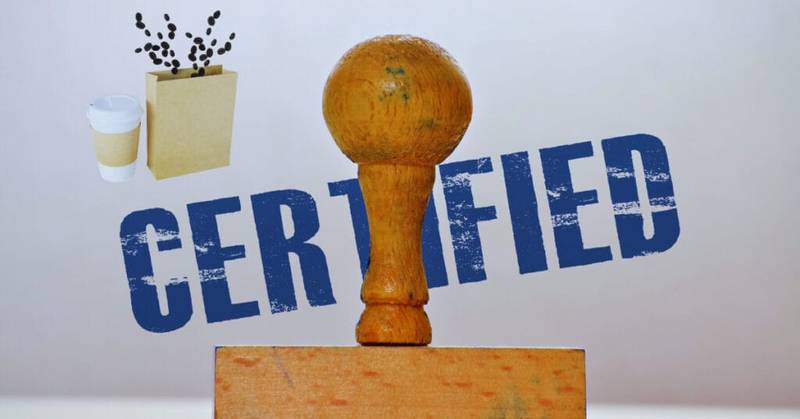
‘’UTZ Certified’’ signifies adherence to rigorous standards in sustainable farming practices.
This label assures consumers that the coffee theychoose has beenproduced with a focus on environmental responsibility, social equity, and economic viability.
The importance of UTZ certification lies in its comprehensive approach to sustainability.
It addresses the environmental impact of coffee cultivation and emphasizes fair labor practices and community well-being.
Consumers actively support a holistic and responsible coffee supply chain by opting for UTZ-certified coffee, contributing to a more sustainable and ethically conscious industry.
Decoding Organic Coffee Labels || Understanding Organic Coffee Certifications

‘’Organic coffee certifications’’ signify that coffee beans have been cultivated without synthetic pesticides, herbicides, or genetically modified organisms (GMOs).
The significance of these certifications lies in their promotion of environmentally friendly and sustainable farming practices.
For consumers ‘’decoding organic coffee labels’’, choosing certified organic coffee ensures a purer, more natural product.
It contributes to soil health, water conservation, and biodiversity while minimizing exposure to harmful chemicals.
These certifications, such as USDA Organic, are essential for those seeking coffee that aligns with their environmental consciousness and health
values.
Understanding organic coffee certifications is pivotal when ‘’decoding organic coffee labels’’ — it empowers consumers to make informed choices prioritising the planet and their well-being.
Direct Trade Coffee: Forging Transparent Relationships for Quality Brews

‘’Direct Trade’’ is a coffee sourcing approach where roasters establish direct relationships with coffee producers, bypassing intermediaries.
This method emphasizes transparency, fair compensation, and a genuine connection between those cultivating the beans and those bringing them to market.
The importance of direct trade lies in several key aspects.
1. Quality Control
Direct relationships allow for a hands-on approach to quality control. Roasters can collaborate with producers to ensure that the beans meet the desired standards throughout production.
2. Fair Compensation
By eliminating intermediaries, more of the profit goes directly to the farmers. This fair compensation supports sustainable livelihoods, contributing to the economic well-being of coffee-producing communities.
3. Transparency
Direct trade fosters open communication between roasters and producers. This transparency ensures that consumers can trace the origin of their coffee, promoting a deeper connection to the product.
4. Sustainability
Building long-term relationships enables roasters to work with producers on sustainable farming practices. This commitment to environmental stewardship aligns with the growing demand for eco-conscious coffee choices.
Direct trade is essential for those who value transparency, quality, and ethical considerations in their coffee choices.
It directly links consumers with those cultivating their coffee, fostering a more equitable and sustainable coffee industry.
Smithsonian Bird-Friendly Certification | Safeguarding Ecosystems in Your Coffee Cup
The ‘’Smithsonian Bird-Friendly Certification’’ ensures that coffee is grown in a manner that supports bird habitats and biodiversity.
Essential for preserving ecosystems, this certification signifies adherence to practices that provide a sanctuary for migratory birds.
Choosing bird-friendly coffee aligns with environmental conservation efforts, making it a meaningful choice for eco-conscious consumers.
Non-GMO Project Verified || Ensuring Purity in Every Sip
The ‘’Non-GMO Project Verified’’ label indicates that the product, including coffee, does not contain genetically modified organisms (GMOs).
This certification is crucial for avoiding genetically engineered ingredients promoting health and environmental sustainability.
Choosing Non-GMO Project Verified coffee aligns with a commitment to pure, natural, and unaltered products.
FAQs || Decoding Organic Coffee Labels
How do you read coffee labels?
“Deciphering coffee labels involves understanding certifications, origins, and ethical practices for a mindful brew.”
Is organic coffee grown without pesticides?
“Yes, organic coffee is cultivated without synthetic pesticides, ensuring a purer and eco-friendly brew.”
How do you label coffee?
“Labeling coffee involves recognizing certifications, origins, and ethical practices for informed and conscious choices.”
Is Charleston coffee Fair Trade?
“To determine if Charleston coffee is Fair Trade, check for the Fair Trade certification on the label or inquire with the brand directly.”
Conclusion
In conclusion, ‘’decoding organic coffee labels’’ empowers consumers to make informed and conscious choices, ensuring a harmonious blend of flavor, ethics, and sustainability in every sip.
From understanding certifications like USDA Organic and Rainforest Alliance to embracing the principles of fair trade and the significance of shade-grown coffee, this journey unveils the rich narrative behind each cup.
As we navigate the diverse world of coffee, it’s clear that our choices extend beyond taste, resonating with environmental impact and social responsibility.
So, whether exploring niche brands or enjoying a cup from a global giant like ‘‘Starbucks, ” the key lies in decoding labels for a flavorful and purposeful coffee experience.



